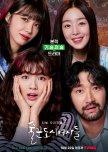
Wake up in the midst of sobering contemporary everyday life issues of 3 women in their 30s and 1 man
With "Work Later, Drink Now", KDrama tackles a sensitive South Korean social issue. What starts as a cheerful, cool FeelGood series turns out to be serious business. Viewers are taken by the hand in a clever, light-hearted way, only to wake up suddenly in the midst of sobering contemporary topics, as we accompany the protagonists in their everyday life, work, family and friendship issues - here in particular: three unique young women in their 30s and one offbeat man.The KDrama points at a topic in which South Korea (though small as it may seem) is once again at the forefront of the world: alcohol consumption. There is so much drinking (and eating, because it's so common) on this show that just watching it can make you dizzy and a little nauseous. To the western eye, that may be WAY too much over the limit. For the Korean eye, it might have to be be sooo much for the audience to even notice that it is/could be too much.
The focus of the story is on three girlfriends in their prime who are hard-drinking and happy to drink. With their personality, they may at first glance be a little off the norm, but then again they aren't. They are (from each other) fundamentally different in their professional situations, socialization and life plans. But it is precisely in this way that they also offer viewers all kinds a sophisticated projection while following each one of them in their everyday life and various challenges they face. The dialogues are razor-sharp, the entertainment high value, the episodes compact. There's also wit, humor and music. This mixture plus the pace are obviously just right to pick up the broad masses of +/- 20 to 40 year olds and to present a mirror of their own living environment in an easily digestible way. The second season will definitely come...
------------ SIDE NOTE: --- Alcohol consumption in South Korea ---
Per capita consumption of converted pure alcohol in South Korea is world class. And rising. The World Health Organization certifies South Korea to be the leading country in the consumption of high-proof spirits. Drinking has established itself outside of private life, especially professionally at company dinners after work. These team dinners often degenerate into a veritable drinking spree (practically prescribed professionally).
After beer, soju is the second most consumed alcoholic drink - a colorless distillate made from rice and added wheat, sweet potatoes or barley, which is on the one hand quite cheap in price and on the other hand, at around 20 percent, is somewhere between beer and high-proof spirits (schnapps, vodka, rum or whiskey ) is located. So it can be consumed in large quantities, especially in combination with beer - and the hangover the next morning is inevitable. South Korea's national drink, soju, is the world's best-selling 'liquor' with around 90 million cases sold each year. Yet, the beer market is also happy about South Korea, which, (in spite of its comparatively small country size) is currently one of the largest and most dynamically growing beer markets on the Asian continent.
What begins as party fun usually ends sadly. In the short term, it may be a hangover. But if you practice this form of alcohol consumption at a high level over a long period of time, the damage to your physical health is enormous in the medium to long term. There are studies that show that even among South Korean students (male), every third (!) drinks to the point of unconsciousness (!) for more than half the week. It doesn't get any better in professional life. And if you don't have a job, there's another reason to get drunk. This has inevitable consequences not only for people and their physical/mental health, but also for the health system. The country pays the price of an enormous pressure to perform taken granted in the context of its own turbo capitalism - with the health of its population and moneywise with billions, too .
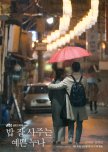
Down to earth romance, providing troubling insight on what South Korean women are facing these days
"Something in the Rain" is a love story about an older woman (35) with a younger man (about 27/28). Yet, above all, the KDrama is a critical social study about relationship taboos and parental respect in South Korea as well as sexism in the workplace. Authentic. Bitter. Sweet.The original title of the KDrama "Pretty Nuna, who invites me to dinner" contains the taboo relationship with all its dynamics on which the story is based - the woman is older (´nuna´) than her boy friend (a no-go!)..., and still being a sucessful employee she earns good money instead of being married (another no-go). Actually in South Korea this is a serious problem of a recent generation gap and gender conflict.
Just consider the significance of "Something in the Rain" (as the romance that it is) in such a broader sense. If you are missing a special icing throughout the story, than this is simply what it is. It is supposed to. Overall, I consider "Something in the Rain" a rather up to date, down to earth, authentic romance, providing troubling insight what kind of circumstances South Korean women (and men) are facing these days.
--------------------- SIDE NOTE --- South Korean women and romance in everyday day life
In relation to everyday life in South Korea the focus on romance and true love in KDrama takes on a whole new meaning. Very few people really have time for a relationship during their professional life. The working days are long. In addition, women are discriminated against at work, sexualized and reduced to their gender role. They work harder (and often more efficiently) than their male counterparts, but are paid less and are less likely to be promoted, as they are bound to get pregnant soon. If they really do get pregnant, then that's it for professional life. Child care for 70-80 workhour weeks (with commuting and company dinners) is hardly affordable. Women do not have to hope for flexible working hours from their employer. So women with children inevitably end up at the stove. Women can forget about returning to work.
As a daughter, women already have a difficult time in the family. If they are married, then first of all they have to relieve the elders - in both families. (If they are not married, they are blamed or rushed oder pushed to quickly do so). Men, on the other hand, are celebrated by families as sons from the start. Accordingly, they present themselves in public with self-confidence and appear more macho. It's not uncommon for them to loudly and rudely gossip about the looks of women in the coffee shop or restaurant or shop or at work or in public. (Actually with the job market being extremely competitive, the appearance of women can not only decide about the partner, but also about the employment).
There are numbers from surveys showing that on average, seven out of ten South Koreans don't have time to date and only about four out of ten are in a committed relationship. The work is more important. Not necessarily because they identify with it so much, but because they don't want to lose it. The pressure to perform is enormous for everyone. As a result, 3/4 of South Korean women between the ages of 25 and 29 are not yet married. Among women between the ages of 30 and 34, more than half are still unmarried. South Korean women also have increasingly modern demands for a self-determined life. They are less and less interested in macho men and suffocating family structures that reduce them to rasing children, representation and the home. This is also due to the fact that normal households can hardly cover their expenses. Family costs money. Divorce rates are rising (South Korea is having one of the highest in the world), yet women are finding it difficult to return to work. There is also a stigma to living as a single parent. (Accordingly, these days not only unmarried couples, but also married couples are less likely to have children.)
Society is in a dilemma. In fact, it can't help but modernize its patriarchal, women-discriminating value systems if it wants to survive. The South Korean population will otherwise shrink under the given circumstances from 2027 onwards. (Update 30.7.22: Statistics Korea reports on 28. July 2022 first time shrinking in 2021 already...)
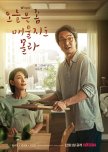
A true enrichment for the KDrama Orbit.
"Recipe for Farewell" is about food for body and soul. About the health-promoting function of food. A meal prepared with care and love may have this function - even in the paradoxical situation where eating is actually no longer possible: in the final stage of cancer in the gastrointestinal tract.As the story is also about cancer, surprising enough this KDrama is not primarily about dramatically approaching the inevitable death. Eventually, sorrow, fear and decay are not neglected, yet the focus is on joy and pleasure in sensual enjoyment of a freshly and carefully prepared meal. It is about the time you share over a meal. About this deliberately sensory, genuine here and now time together. A good, unforgettable time.
In this KDrama two quite opposing moods harmoniously go hand in hand. Death, pain and farewell may hang about. However, life and the joy of it are not overshadowed by impending death. In fact, "Recipe for Farewell" is not gloomy or heavy. Rather, it emits somehow velvety-silky, comfortably warm rays of light whenever it threatens to get dark and in spite of sadness.
In KDrama there is always eating and drinking at some point. Now that's not special. But in "Recipe for Farewell" everything to do with (Korean) food is intelligently, sensitively, carefully, sensually and lovingly mixed in a stylish way. Eating becomes an explicit topic - from the carefully chosen recipe, mindful purchase and loving preparation to conscious consumption. Each episode is named after a Korean dish. You can learn a lot if you like. In any case it is enjoyable to watch - aesthetic, stimulating, inspiring.
Apart from recipes and the preparation of the dishes, the story draws attention to the essence of food: to the radiance that passes from food to soul. To the joy of being alive. To the gift of being part of this eternal process of transformation that is life: From seed to flower, fruit, leaf, root, color, smell, touch, taste, temperature, liquefaction, finally compost, gases... and dissolved into air.
The story is based on an autobiography of the same name. In it, author Kang Chang-Rae describes how by cooking for his terminally ill wife he actually started cooking from scratch. And that triggered quite a bit - within himself and people around him, too. "Recipe for Farewell" doesn´t aim for your heart. It goes even deeper and reaches out to your gut. This is about ´true and sound´. The characteristic gaze of the protagonist, who is deliberately focused on his job as a chef in the home kitchen, is rather simple and objective. Eventually, by unpretentiously doing his job, their flows dynamic new life within the relationships with his ex-wife and his son, too.
Eating together - the meal - becomes the symbol of the truce of all worldly disturbing topics and opens the way to community -> connection -> bonding -> closeness ... by sharing space, time and the (eating) joy, to be alive (= to be able to see, smell, taste and digest).
The original idea is based on an impulse, that came from his ex-wife, when she actively asked him to cook for her during this last few months - and thus be and remain there for their son (who lives with her) when she can no longer. She wishes for peace between father and son, at the latest when she is gone.
Such a final farewell process may be painful for everyone. The disease itself may be painful. This is acknowledged by this KDrama. Yet, the focus is rather on the shared time together when the mother, father and son feel GOOD with one another. "Recipe for Farewell" truly presents a wonderful recipe for saying goodbye - loving, calm, grounded, with simple, three-dimensional sincerity and warmth. Leaving father, son and audience - although sad as it may be at times - with a positive, thankful outlook on life.
"Recipe for Farewell" runs on the South Korean streaming provider Watcha and is very popular there. The series may even trump the acclaimed production "Semantic Error". In any case, the number of paying subscribers noticeably increased during first week of broadcasting... And in the Watchapedia app, the KDrama is ranked 1st among 190 series from 2022 with 4.5 out of 5 possible points in the viewer rating. I agree. Pretty much everything is done right here. The actors are doing a fantastic job, too!
A true enrichment for the KDrama Orbit.
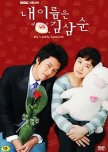
A highlight in KDrama history in terms of the processing of women´s beauty-dilemma
Admittedly, "My Name is Kim Sam-soon" is comparatively old. Here you can experience Hyun Bin very young, almost boyish in his early 20s. Nevertheless, I consider this series to be a highlight in KDrama history in terms of the thematic processing of its content. Yes, there's a lot of nagging going on in Korean style. But the arguments and what is being carried out, it has it all.It's about women's beauty ideals, especially about being slim. About last-minute panic among women over 30. About romantic ideals and the reality of relationships. About professionally successful women (and those who want to become or thus have big dreams) - not only the protagonist, but also her mother, her potential mother-in-law and the male protagonist's restaurant manager and ultimately also the male protagonist's ex.
The underlying question is whether a woman, who does not define herself by her slimness and beauty, has a chance of 'getting' a handsome, nice man. Is she even perceived as a woman? Taken seriously? From what else can a woman draw her self-esteem beyond 'beauty' to find her place in life - self-confident and happy. Is that even possible? Is attractiveness in the sense of the ideal of beauty a prerequisite for marriage, family and/or for success at work? And is all this the prerequisite for a happy life? Or maybe the question is completely wrong? Shouldn´t it not be a happy, healthy life at the beginning and then you see what else might be added to it? ...love and self-love - the thing with the chicken and the egg...
"My Name is Kim Sam-soon" tells the story about the female flaw without miraculous transformation. At the beginning (and at the end!) there is a self-confident young woman who is overweight (I would say ´normal´ (vs ´ideal´) weight, but obviously not by Korean standards). She has quirks and doubts, talents and visions, hopes and charm. She doesn't let the adverse winds in her life get her down. Her courage sometimes fails her, but she knows exactly what she wants and even better, what she doesn't want. Although her body dimensions do not meet the standards of the fashion industry - she is painfully aware of this, because that is what those around her tirelessly mirror - she does not question herself. As best as she can, she stands by herself and what she thinks is right.
Kim Sun-ah has won multiple awards for her portrayal of Kim Sam-soon. I have the greatest respect for her, because she lives her role to the fullest, just as if she were Sam-soon for real. In a world dominated by the eyes of men, she convincingly fights on behalf of several generations of women for gender-independent self-confidence, for quick-wittedness and for unconditional self love. She had put on quite a few kilos for this role in order to get away from the usual ideal of beauty. So she wins tons of hearts of women (from all over the world), for whom she carries out her inner and outer struggles on their behalf. In 2004, ratings at times reached almost 50 percent. ...The topicality of the subject has not diminished around 20 years later (one could say: "unfortunately").
The original title is: 'My name is Kim Sam-soon'. Internationally, the KDrama is marketed with the title "My Lovely Sam-soon". That's actually an insult (in my opinion). Didn't the 'decision makers' (they must have been men) actually see the series? Why do they focus the narrative perspective on the male protagonist and also emphasize his possessiveness with this possessive pronoun? And why do they only reduce Sam-soon to her appearance again? I do not get it. I assume that these ´decision makers´ probably didn´t understand anything. Even if it's possibly meant to be ironic, I consider that impossible... In any case, I choose the appropriate international title "My Name is Kim Sam-soon".
By the way, "Sam-soon" is an old-fashioned name for the third-born. It has a certain charm that this 'old-fashioned' birth name represents a bigger self-esteem problem for the female protagonist than her looks...

In the first half, the KMovie is actually a one-man show. And that, I think, is the strongest part
"#Alive" is a variety on hip zombie stories. First things first: it doesn't have much new to offer in this respect - zombies as a plague that spreads fear and terror, a horde that you want to shake off or destroy, like disgusting, annoying vermin. Well, that's not why I would recommend this KMovie.I also don't think that you have to overstrain the reference to the Covid pandemic and the sometimes grueling current lockdown experiences that come with it.
Even fans of the horror genre won't be really happy with "#Alive", because "horrifying" can surely be done even better.
So why am I mentioning the KMovie here? The script revolves around surviving in an almost hopeless situation. However, the focus is not mainly on the action, but rather on the quiet moments in which the protagonist is ruthlessly thrown back on himself. There he is alone with himself and his inability, facing his insufficient survival skills, his loneliness and hopelessness ... and finally the desire to leave this world.
Oh Joon-woo isn't a born hero - perhaps he was trying to be in the day-long, night-long computer games, with his joystick in hand. But then the Internet connection is gone, no water supply, no food, no one can be reached. The self-chosen isolation in his room with his virtual game world, which has shaped him to this day, is one thing. Real isolation with real threats and no virtual team is something completely different. It's about that juxtaposition and the painful process of waking up to a NOW that's so different from the gaming world. Ultimately, the impulse comes from outside, which helps him to venture out of his safe cocoon into the real and thus truely threatening world.
However, the movie isn´t anti-technology. On the contrary, in playful creativity technical gimmicks, old and new, give the story new impetus again and again.
In the first half, the KMovie is actually a one-man show. And that, I think, is the strongest part. It's never boring. Actor Yoo Ah-in once again uses the chance to show what he's made of. In this way, the viewers accompany him through his very personal Hall of Pain, and there he hardly omits any physical form of expression. For this he has meanwhile been awarded the Cine 21 Award for best actor. After almost half the distance he gets support from Park Shin-hye, who embodies a character who pursues a completely different survival strategy - namely, she has one, even if she also reaches her limits with it. As is well known, more than one person form a group and a group develops its own dynamics, which can do more than each individual on their own. Here too. Both of them grow together. Heroes are rarely born as such...
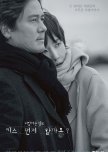
A three-dimensional, grown-up love story, sensitively told and spiritedly acted
When people have lived for more than four decades, they are usually disillusioned in many ways. Hope for romance and love has given way to various, quite specific experiences... and these are inevitably paved with disappointment and suffering, too. However, it´s not necessarily too late for a new love. It might be different, though. More grounded. Honest. Upright. Less games. Sincere closeness and warmth become more important than romantic squabble. The time ahead is finite. And you no longer expect a fairy tale full of magic, but rather wish for true moments, a safe place to catch your breath and recharge your batteries. Reliability. Trust and emotional intimacy.The protagonists in "Should we Kiss First" have all been through life for some time. The two main characters have had children and lost them again, have been married and divorced, lived more or less honest but empty lives. SHE has been a stewardess for 20 years and suffers from insomnia. HE is a co-founder of an advertising agency and has cancer. Neither of them want to be alone. Neither of them want a relationship. Hm. Difficult. Their best friends each want to pair them off ... and at last are successful. However - being in makjang KDrama Land - the past of the protagonists gets involved in the present and triggers a lot of turbulence.
"Should we Kiss First" focuses on two adults who (re)experience love in a way they never expected. Love is not primarily supple, sexy and redeeming, but presents itself as irrational, brittle, stubborn and complex. As such, it demands one thing unconditionally: complete surrender to this feeling, which remains in spite of adversities, yet does not solve any problems. However gives the necessary strength to face them.
Does this power come from the love you experience from someone? Or from the love that you give yourself? The beauty of this KDrama is placing the emphasis on the fact that it is your own radiance which makes a difference. The love we open up to and give in to makes the difference how we experience life, or what options we recognize and choose... It's about giving in to your feelings, letting them be (even if you rather not put up with it) and trusting them.
The story is told in different nuances - sometimes humorous, sometimes profound, sometimes tender, sometimes playful, sometimes harsh, even fists are flying at times. Enjoying the moment to the fullest and the pure love of life have just as much space as the desolate moments of emptiness, embarrassment, destructive anger and listless lethargy. The dialogues are carefully chosen down to the last detail. And then there are the subplots, that round the story off.
A three-dimensional, grown-up love story. Yes, once again a story about love, but not cheesy. Instead, the story is sensitively told, spiritedly acted and filled with a love for detail. On top of that, a story full of sometimes subtle, sometimes explicit wisdom. A KDrama that doesn't sugarcoat anything, yet feeds you with a satisfying sigh.

Captivating. Cinematic. Action-packed, yet offering impressive quiet & heartwarming tuning, too
Gando is the land of the desperate, the realm of the desperados of Joseon. In the 1920s, it was also a territory in which political responsibilities and affiliations were vaguely regulated. Some things may remind you of the Wild West. Yet this Wild North in the Far East is quite different...“Song of the Bandits” is a brilliant Netflix historical drama about a certain chapter of recent Korean history. Moving. Captivating. Cinematic. It exudes the vibes of an Eastern. The KDrama surely is gory action and turbulence at most times, but offers impressive quiet and heartwarming tuning, too. Action-packed it is, yet humor and romance modestly fit in as well. "Song of the Bandits" is astonishingly well balanced in this respect and for a Netflix production, despite its polished and action-driven choreography for a broad international audience, sticks surprisingly consistently to a more subtle Korean series style. Nicely done at all scales. We get a feeling of the Manchurian landscape with Gando impressions filmed at original locations. This all framed within a consistently beautiful soundtrack. It all lasts for 9 episodes (only! Yet?). In spite the overall ambitious commercial production context, aiming at an international “Squid Game”-like success, “Song of the Bandits” was able to impress me with a historically and emotionally complex story with great mimes - Kim Nam-gil, Yoo Jae-myung, Lee Ho-jung and Lee Hyun-wook in their element. But so is everyone else. This is where KDrama and Netflix perfectly come together...
'Bandit: The Song of the Sword' is the original title. In fact, people don't swing swords so much as they use firearms. The KDrama is epically processed, offers great emotions, while telling about people and the range of motives for which people are prepared to fight. It's about resistance, obedience, venality, oppression, social affiliation, the fight for freedom. There are even some spiritual thoughts attached to it along the way. It is about the Joseon people, some personal fate, as well as 'the' history of Chosen - an emotionally quite ´Korean´ excerpt of modern history. Its thematic historic setting (even if the rest of the world might not care so much about it, as it is not requisite for an entertaining series pleasure) contains a lot of explosive material by Korean standards. Therefore firearms are in several respects quite consistent in this context…
As far as I am concerned, I do care about the historical context. On the contrary, I find it quite intriguing - besides the dramaturgically action-packed and emotionally charged story with its complex, interwoven relationship dynamics and conflicts. As I said, you don't really need to know the background to be enthusiastic about "Song of the Bandits". But if anyone might be interested, see the historical side note about 'Gando', the border region on the north bank of the Tumen river, which today also marks the border between northeast China and North Korea.
PS:
Yep, the ending of the story...
If you like, you can dream of more. It could be possible. Yet, it would still go on and on.
Who knows if there may be a sequel...
Nevertheless, from my perspective the ending is quite fitting. (Whether I like it or not.) In terms of the historical events, things are as they are. We want fiction to write a different ending, but it still wouldn´t be any better, rosier or brighter for hardly any of the various protagonists... Therefore, from a Korean perspective the ending of this story remains true to the spirit of the actual Chosen-history: For Joseon people it is and remains unsatisfactory, unfair and painful. ´We´, as an international audience (temporarily and figuratively with our personal discontent), can/shall/must/may thus empathically share this collective emotion, too.
-----------------------------------------------------------------------
SIDE NOTE: --- Gando, also called Jiandao, and today Yanbian ---
Gando historically stands for a specific borderland. To this day it is a region with a high proportion of people of Korean origin.
Gando is a small, perhaps inconspicuous scar in Korean history – yet a scar that is still weeping, sort of...
Gando (and Manchuria in general) is also associated with the regrouping of the Rightous Army and thus with the patriotic pride of resistance against colonial oppression. With "Song of the Bandits", the issue of Gando has now obtained an impressive, international onstage introduction...
This 'Gando', Jiandao or Yanbian was the last nail of hope for an increasing number of desperate people from Joseon (and still is for some North Koreans today) who had nothing to lose and would rather settle for an arduous life and try their luck in this section of Manchuria - a back then relatively undeveloped marshland on the north bank of the Tumen river.
First - in the course of, and especially at the end of, the 19th century - famine and poverty drove poor Joseon people to the far north. Then, at the beginning of the 20th century, it was the hope to escape from Chosen, which was finally officially annexed by the Japanese. The Righteous Army militia was also formed anew in Manchuria at that time.
After the annexation of Joseon, with respect to a relatively large population of Joseon people, the Japanese as part of their aggressive expansion efforts also demanded this coastal territory north of the Tumen from the Chinese. Infiltration was followed by an invasion in 1907, but already by 1909 there was withdrawal again. Officially, as a result of the diplomatic negotiations, the area eventually became Chinese again and Japan received railroad concessions, while the Joseon people remained under Japanese rule due to their Korean descent.
"Song of the Bandits" sets its story in this political quagmire: the decade before the belligerent 1930s, before the Empire of Japan invaded Manchuria, established the puppet state 'Mandschukuo' and used it for its own political and economic purposes. The prerequisite for this was a massive expansion of railway lines - especially the North Chosen Line along the border region between Chosen and Manchuria, that had been built during those previous years, while the Bandits sang their song...
Outlook:
After the end of the Second World War, many Koreans went back to their homeland, but by no means all of them. Around 810,000 people of Korean origin apparently still live in the Yanbian Autonomous District of China's Jilin Province to this day. In 1952, the proportion of the population with a Korean migrant background was around 60 percent. Then, Korean language was official. However, especially since the late 1990s, the Chinese government had specifically tried to force linguistic and cultural assimilation in order to counteract political currents in South Korea and discussions about a possible legitimate Korean claim to 'Gando'. These currents believe that - regarding those dubious events of the early 20th century and Gando Convention between Japan and China becoming obsolete with the ending of the World War II – this Gando territory actually is political void and should now belong to (in this case North?) Korea. Thus, Gando's territorial status for some still is not satisfactorily resolved…
Incidentally, desperate North Korean refugees are continuously trying to get to China via the Tumen river, which is icy during the long, cold winter months. Thus, Gando territory invariably remains a last nail of hope for desperate Koreans even up until today...
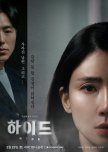
Dramaturgically opaque fabric of a multi-dimensional plot tapestry
At first glance, "Hide" is none of the spectacular KDrama productions, yet on the solid side of KDramas, I consider this production first class.We get an extremely complex crime thriller in which white-collar crime is intelligently mixed with many other criminal activities as well as incitement to and covering of criminal activities, plus fraud and adultery and even more. It is based on the Welsh television series “Keeping Faith” from 2018. However, the KDrama freely unfolds its own, definitely South Korean-tinged storyline. (There, of course, the Jaebeol shouldn't be missing, ...who, together with their henchmen, are significantly assigned the role which a gangster clan played in the Welsh series...)
“Hide” definitely offers a dramaturgically opaque fabric, where motives and entanglements reach beyond 'today', too. Continuously weaving surprising twists into the multi-dimensional plot tapestry turns out to be the great strength of “Hide”. Thanks to the entire production team in front of and behind the camera the story grippingly enfolds…and enfolds… and enfolds…
And in true KDrama-like style, no character remains one-dimensionally black or white - no matter how questionable or malicious they may act. Likewise, sooner or later we can relate to the motives of the different characters and why they were drawn into dishonest or even criminal actions. (Even if you don't have to approve of the actions, let alone like those characters.)
Complex. Dense. I would recommend this gripping crime thriller to fans of the genre, who like it with a topping of Korean emotionality.
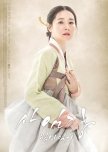
Visually stunning with a truly poetic story. Insights into the early 16th century art included
"Saimdang, Memoir of Colors" is an excellent KDrama with historically impressive dimensions. The focus here is on the legendary artist Shin Saimdang, whose head is also depicted on the 50,000 won note today. The KDrama pays tribute to the great artist and also pays tribute to her roles as a devoted mother and virtuous, yet uncompromisingly progressive woman. The focus is on a time and space transcending, tragic love story - fictitious... or at least not historically documented. (But why should´t it have happened in this way or another? ... :-)----------------- SIDE NOTE --- Shin Saimdang (1504 -1551) ---
... was a painter, calligrapher and poet who was valued in her time and far beyond. Since her father had no son, he gave her (rather unorthodox for a girl) an education and training in literature, poetry, calligraphy, embroidery and painting. Her works as a painter are characterized by their particularly sensitive view of nature and its subtle, sensitive representation. Today only about 40 paintings in Indian ink and mineral colors can be directly assigned to Saimdang. However, it is suspected that many more works of art have survived, although they are not clearly signed as her works. Shin Saimdang has also gone down in history as the ideal of the good mother. She had five sons and three daughters, some of whom also inherited their mother's talent. One of her sons is the even more famous Neo-Confucian scholar and politician Yul-gok Yi I.
-----------------------------------------------------------------------------
In addition, as far as the perspective of traditional art is concerned, the special focus of this KDrama is the nature of the world of animals, plants and mountains. Actually, it could be mentioned here, that South Korea is characterized by several mountains and 21 national parks on more than two thirds of the country's surface. This KDrama aesthetically focuses on the spiritually legendary mountain region around the Geumgangsand - The Diamond Mountain. It probably got its name in connection with the Diamond Sutra of Buddhism. It was a center of Korean Buddhism, traces of which can be dated back to the 1st century. At the beginning of the 20th century there were still more than 40 active monasteries in the region. In any case, the mountain world plays in several respects an important role in this gripping historical drama.
Special dynamics arise through the play with intertwining time and space. There are two plots. One is set in 2017, the other in the early 16th century during the Joseon era. One follows a young art historian writing her PhD thesis on artist An Gyeon's work 'Geumgangsando'. The other follows historical Shin Saimdang through the first 3-4 decades of her passionate yet virtuous life. Parallel to the art historian's research and struggle with it, that is at the same time enhanced and endangered by Saimdang´s diary, insights on the artist´s eventful life are revealed. Both storylines are quite exciting in their own way. Particularly charming: people from Saimdang's time-line seem to have reincarnated in Seoul in 2016 and are once more somehow connected to each other... Surprisingly, the fulcrum where the timelines converge is Tuscany in Italy.
This extraordinary and visually stunning KDrama offers a truly poetic, heart-rending story, added with interesting insights into the special aesthetics and sensitivity of contemporary Korean art of the early 16th century, as well as the paper production craftmanship of that time. It is rounded by an atmospheric soundtrack and, last but not least, actors who are as if absorbed in their roles. At last, there is plenty of makjang, too.
Taking everything into account, the story is effortlessly captivating over 28 episodes.
At the end I was left in bewilderment, yet to some extend somehow surprisingly satisfied, too.
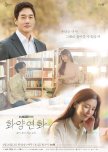
Good stuff. Complex. Powerful at times. Yet you better don´t set the primary focus on the romance.
No idea why the international title is what it is... so beware! If you're expecting a love story here, you'll get one, but certainly not in the way you thought it would. With their motifs and soft focus, the posters for the KDrama also promise more heartbreak of the shallow kind than the story does justice to.
The original title "The most beautiful moment in life - the moment when life becomes a flower" describes the moment in which life (not love) acquires meaning, beauty, direction, form and can blossom. And here we are closer to the topic. The two protagonists have been in love with each other since their student days in the 90s. Yes. But it has grown through their attitude to life, the meaning they give to their own lives, through their principles and quite specifically through the class struggle, the union struggle, the demonstrations for more democracy. By boldly standing up for what they believe in, life is transformed into a (bright, fragrant, inspiring) flower.
To reduce life and its beauty to love would not be enough. But love is definitely part of it - just like water or the sun - to let these flowers (which can/want to be a person's life) grow. This flower reveals its inherent beauty in the creative expression of what is important to you, what you stand for, what you believe in.
In that sense, Yoon Ji-soo's seedling came to life after she met Han Yaeh-hyun during his pro-democracy and workers' rights protests. Ji-soo's enthusiasm for Yaeh-hyun's cause didn't go unnoticed for him either.
-------------- SIDE NOTE: --- Early unionists, political protest and rebellion against injustice ---
We are learning about South Korean democracy movement when it was still in its infancy. During the decades of the dictatorship, conservative politicians skillfully exploited the fear of the communist north and consistently interpreted or pursued any commitment to workers' rights as a communist threat. Strikes and demonstrations were always uncompromisingly dispersed and participants and leaders sentenced to prison terms. Even recently, in the last 5 years, trade unionists, fighting for workers' rights, have been and continue to be arrested for "offences against public order". In the case of convictions of corporate bosses/Jaebeol, a pardon usually follows quickly. Unionists, however, always have to serve their long sentences. Recently, for example, the KCTU chairman Han Sang-gyun was sentenced to three years in prison during an organized mass rally for workers' rights (2016) and Jang Ok-gi from the construction workers' union was imprisoned for a protest march for higher pensions for non-permanent construction workers (2017).
---------------
So the context of this love story is quite serious. And the KDrama cleverly wraps and links this 'seriousness' around the love plot of the two protagonists. The story is told in time leaps between then and now. It tells how Ji-soo's father (head of the district attorney's office) opposes the young love, it tells about Yaeh-hyun's father's unsuccessful struggle for worker´s rights, about Jaebeol Jang Sang, into whose family Yaeh-hyun marries, and about the unscrupulous intrigues of father and daughter, as well as the elite family of lawyers that Ji-soo married into. It tells of the intolerable arrogance of the wealthy towards the lower-income classes, which continues in the form of bullying among their children. It tells of courageous class struggle and rebellion against injustice. It tells of the almost hopeless struggle for one's own rights in the face of powerful opponents. And that it's never too late to let the flower of your life bloom.
So, should you watch it? Yes, it´s good stuff. Complex. Powerful at times. But don´t set the primary focus on the romance. Otherwise you might be a bit disappointed.
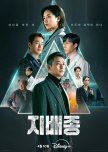
Crisp and tasty KDrama - revolving around some hot topics that one might rather want to call sci-fi
Intelligent, sharp, with strong characters. A crisp and tasty KDrama. “Blood Free” got me immediately - with an original hook, set within a gripping milieu, topped by thoughtful demeanor of interestingly authentic protagonists and splendid casting.Of course, the interfering natural interest of those in power (who obviously can never keep their hands off) is not at all surprising. Yet, the processing of some rather hot contemporary issues was presented in a refreshingly concise manner. Including topics that one might call a dream of the future... A bit far-fetched here and there? Perhaps. Nevertheless, often enough well grounded in common sense.
I assume there could as well be a second season... because the end doesn´t necessarily have to be the end, does it?
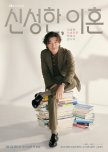
The story being told in an unagitated & well-rounded way unfolds its unique (I´d say: high) quality
"Divorce Attorney Shin" is actually based on the webtoon of the same name by Kang Tae-kyung. The KDrama comes with the handwriting of the same screenwriter as i.e. "Thirty Nine", "Always" and "Encounter" – Yoo Young-ah. In the case of "Divorce Attorney Shin" once again shows off her strengths: drawing true-to-life, sensitive portraits of friendship and relationship dynamics with plenty of ordinary life of ordinary people. In "Divorce Attorney Shin" you get (also thanks to marvelous actors/actresses!!) authentic, lifelike characters and circumstances. In this case with sometimes maybe a bit weird, but loving details. With characterful esprit. Unagitated. At times a joy to the heart. Almost soul food."Divorce Attorney Shin" tells stories from the red-hot everyday life of many people in South Korea, which is increasingly about divorce. The number of divorces in the country is currently going through the roof. The topic becomes almost normal madness. KDrama understands this just as such. Divorce is normal. Not nice. Not desirable. Not originally intended. But often unavoidable as the next step. And sometimes maybe...
(A bit tongue-in-cheek: the title. Attorney Shin's name "Shin Seong-han" literally means "sacred" in Korean. Thus, his name tag "Shin Seong-han, Divorce" becomes a provocative play on words. Attorney Shin is also the man for the cases when the ´holy state of marriage´ has faltered...)
There are many reasons and circumstances behind such a momentous decision as divorce ( ... and it may always accompanied by a bit of shame and feeling of failure, which needs to be digested emotionally). Some of them come along enrobed in different cases. They are weaving their way around the frame of the story, the main focus of which are three old friends – above all, however, divorce lawyer Shin Sung-han. One of the recurring scenes is the small but finely drawn retro lawyer's office with a wooden sliding door that sometimes gets stuck, which you quickly grow fond of. Also, Shin's apartment with retro-style hi-fi, where he spends his evenings listening to loud Trot music, preferably singing and drinking soju from a wine glass. And then the cozy Ramyeon restaurant around the corner from the office. Added to this is the special relationship between Shin and a client who ultimately joins the team and another young lawyer, who somehow stumbles over Shins piano skills into the office. And then there's his own past as a gifted pianist and the reason why he's no longer one.
Kudos to the layered nuances that paint the complex environment in which divorce tends to be embedded. No divorce is like the other. But most of the time, divorce hurts or hurt started before and therefore led to it. "Divorce Attorney Shin" touches on a multifaceted assortment of backgrounds and triggers over the course of 12 episodes short-term critical circumstances and long-term effects, emotional suffering and opportunities, economic chains and hopes, social stigmas and societal prejudices, and then, too, self-doubt, as well as collateral damage and sacrifice. It's not always just 'the others' who are affected, but the controversial issue of divorce is getting very close to almost all of the protagonists. JTBC attacks a hot social topic with the KDrama.
"Divorce Attorney Shin" offers all this embedded in a variation of slice-of-life. Leisurely, cozy and enjoyable – and therefore digestible. But it's not at all harmless. There is plenty of law-and-order with a comprehensive arc of suspense. On the one hand, this is the professional talent of our protagonist – although not his only one. On the other hand, there is his own family history, marked by the pain of separation and divorce, which is unexpectedly stimulated anew. The dramaturgical dynamic of the story is increasingly gaining momentum and ultimately steers inevitably towards Shin's very personal showdown, where justice is fought – not with firearms or fists, but according to the law, with evidence and with a sense of proportion, heart and mind.
In my opinion, the story finds an extremely fine nuance on all levels, which shows an ever deeper effect over time. Subtle but lasting. I would associate (not timbal, but) Koshi chimes – depending on topic and episode, sometimes more in the timbre of Aqua, sometimes more in the timbre of Aria, sometimes more in the timbre of Ignis, and sometimes more in the timbre of Terra... The story being told in a coherent and well-rounded way unfolds its very unique (I´d say: high) quality.
-----------------------------------------------------------------------------------
SIDE NOTE: --- Trot ---
KPop is a 2000ff phenomenon in Korean music history and by now even most non-KDrama fans are familiar with it. ´Trot´ however probably is less known. But beware: maybe in the not too distant future there will also be a KTrot, who knows...
'Trot' dominated the Korean music scene – as the earliest form of popular music in the peninsula. Trot is less well known to the rest of the world, but has experienced an enormous revival in its own country in recent years, which is now taking the genre even beyond national borders, too. "Divorce Attorney Shin" presents one of the hits, which was released brand new in 2020 on the CD "9 Stories" by Trot old master Na Hoon-a. The 72-year-old landed a megahit, with its YouTube video being viewed 25 million times and thus temporarily relegating the superstars BTS and Blackprint to their places. Korean cultural export strategists are smart and quick. The song promptly finds its well-staged place in the appropriate KDrama with "Divorce Attorney Shin", which also takes the direct route to the international audience via the Netflix streaming platform…
'Trot' grew on Korean soil and is quite retro in its foxtrot and slowtrot beat derived from standard dance. 'Trot' goes back to the time during the Japanese colonial period and the import of the 'enka', mixed at that time with the folksy, epic pansori lamentations (at least for me often reminiscent of flamenco), as well as the traditional aesthetically harmonious, lyric poem form Siga. However, due to its entangled roots with the Japanese 'enka', 'Trot' fell under censorship from the 1960s onward and only resurfaced in the 1980s. However there was also J-pop , hip hop and rap allowed to reach the masses and with that influence the then upcoming new and hip KPop pushed 'Trot' into the background.
Only now, when KPop is firmly established, does interest and space for something 'new', identity-establishing traditional obviously open up again. There may be something old-fashioned about ´Trot´, since young people are more familiar with it via their grandparents generation. However, the music triggers a nationally rooted, melodramatic emotionality... It's quite possible that a contemporary, new variation of internationally hip KTrot will develop over the course of the next few years. At least the trot is rediscovered – not first – but also by "Divorce Attorney Shin"...
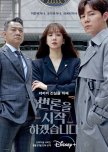
Nonchalant, sassy, intelligent - a solid enrichment among law&order dramas
"May it Please the Court" is one of my favorite series amid the flood of Law & Order series 2022. I appreciate its witty and grounded touch. I also appreciate the playful, sassy and natural at ease dynamic between the two leads. You get wit without silliness and on top of that an exciting story. In addition, the question (which is obviously burning at the moment in South Korea) about the solid handling of the rule of law in the face of apparently overpowering forces that control politics, the executive and the judiciary, is intelligently incorporated into the network of relationships and case processing.The story is based on a book with real cases, written by public defender Jeong Hye-jin ("Let Me Start the Argument"). This makes the Disney production a solid enrichment for current courtroom dramas. In addition, this KDrama doesn´t try to downplay its KDrama roots in favour of international streaming market standards. The KDrama remains true to itself and doesn't rely on more violence or sex than usual It rather builds on proven emotional storytelling with an excellent cast and a loving eye for the nuances.
The intro offers an impressive, brilliantly cool stylization of the KDrama orbit, in which the one percent of society is always involved: the fircely quarreling, shaken by internal intrigues and secrets, outrageously rich family clan, in which everything is about the best law firm, the greatest impact on the prosecutor's office or the fat contract. Here you have to be clean, untouched, respectable (which you rarely are). The profession of choice is a lawyer and/or sooner or later assemblyman and ideally a presidential candidate.
So far, so good... we´ve seen it many times. Now, however, the story is driven by a new powerful perspective: the world of public defenders who handle legal cases from the world of ordinary, often destitute people at the bottom of society. Worlds clash - worlds both with people involved. The interface is incorporated by No Chak-hee, who has lived in either. As the number 1 in the law firm, in which she has just been promoted to the youngest partner, she is being transferred to the mandatory public defense. What she doesn't know: this is mere political calculation of her very esteemed superior. What she also doesn't know: the encounter with her new colleague and the world of public defense will unhinge her worldview and give her work new direction and grounding.
Suspense has the central characters fatefully under control. A series of murders occur. Crimes emerge behind old, long solved and forgotten cases. No Chak-hee realizes that even she can no longer wash her hands in innocence. Guilt. Innocence. Right. Wrong. Culprit. Victim. Justice. Injustice. The perspectives get a bit out of the sounding line.
KDrama at its finest. Good entertainment, while also being socially critical and up to date. Pithy. Nonchalant. Intelligent. Exciting. Romantic vibes included.
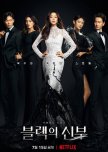
Ready-made. Still worth seeing. Social satire about status & by all means climbing up social ranking
"Remarriage and Desires" tackles a central theme of South Korean social life: who should I, can I, must I or do I want to marry? Marriage, family and status throughout the centuries have been forming a magical triad in this Confucian shaped country - a triad which can decide how happy or unhappy life will become... Yet, these days within the framework of the short-timed everyday life and performance-oriented professional life in modern South Korea there is simply no time for naturally meeting someone and dating. However, the right choice is crucial. So instead of spending time, you spend money and thus can be matched up professionally. This actually has a good tradition in elite circles, where matchmakers were already in high demand during past Joseon days. Arranged marriages - whether devised by shamans, personal matchmakers, professional matchmaking agencies or parents - are widespread today and have recently become trendy even among the less elite classes of society. ... As a good choice can decide everything..."Remarriage and Desires" takes this subject into the grotesque - in a satirical guise with a proper breeze of Makjang. A stately squad of spiteful, greedy contemporaries at the highest ranks are brought together to tell a bitter tale of revenge on revenge on revenge. The bad news first: the Netflix production unfortunately does not get beyond a script that has been polished for the international streaming audience and that also seems to be off the shelf. The good news: KDrama is even good at telling such ready-made stories, too. By the way, it's the intensity of the female leads who are allowed to rock the makjang-show: Bad, worse, the worst... and there still is worse (The men rather become victims and ornaments.)
My criticism: Scheme-F. Ready-made.
The heartbeat get´s lost. The depth is missing. It's not really possible to develop an emotional closeness to the protagonists. Overall, "Remarriage and Desires" thus comes across as somewhat distant and stiff in comparison. As a spectator you will feel less sympathy (from the inside) and instead watch more (from the outside).
You might binge through the (only) 8 episodes pretty quickly. But without the nuances, something is missing. For me at least. I didn´t feel an emotional bonding growing of any sort. Too bad.
However! the KDrama is still worth seeing as a satirical social study about the South Korean middle and upper class (or a general would-like-to-marry-into-the-still-higher-class class).
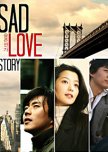
Yes, it is sentimental. Yes, it is emotionally intense. Yes it is a Love Story - KDrama style.
"Sad Love Story" marks the beginning of the wave of success that over the past two decades has carried KDrama far across the South Korean peninsula. It has mastered the art of telling drama in a way that grips the heart and doesn't let go until the end - even if some aspects are predictable and there are clichés: the journey is the goal. One is always close to the emotions of the protagonists and they move unrestrainedly up and down. More drama is always possible. Yes, it is sentimental. Yes, it intends to be emotionally intense. Yes it is a Love Story - KDrama style.Actually, "Sad Love Story" is a love story through and through. Touching in all possible directions. Obviously 'sad' too. The story navigates between 'blissful' and 'desperate' within a fascinating field of tension and relentlessly takes the audience along. At the same time, "Sad Love Story" is a study of how often supposedly small interventions (actually more like assaults) - sometimes nasty and selfishly motivated, sometimes noble and well-meaning - can mercilessly plunge one (or more) lives into misfortune. The level of pain and suffering people can endure is amazing (and encouraging). This story is fictional, but reality is full of it in all sorts of variations.
Among other things, in this KDrama one is confronted with the USA - from a South Korean perspective. That's quite interesting, too. "Sad Love Story" thus points towards a reality that people in the 21st century might be happy to forget. South Koreans and Germans probably have this in common: the presence of foreign military forces. Since the Korean War of 1950-1953, the USA, as an ally, has operated various military bases in South Korea to help defend the country in the event of a military threat from North Korea. After Japan and Germany, the United States is showing its strongest military presence with its troops stationed in South Korea. Camp Humphreys south of Seoul is the largest unit with US military personnel stationed overseas. There are several more, i.e. including Army Garrison Yongsan in Seoul, Camp Walker in Daegu, United States Navy Fleet Activities Chinhae near Busan, and two Air Force stations in Osan and Gunsan south of Seoul.
------------------ SIDE NOTE: --- "American Towns" ---
"Sad Love Story" puts the "America Town" (or "A-Town") of Gunsan in the focus of the story. The Air Force Station on the west coast is rather small, but the stationing of the US soldiers ensured that an entertainment culture geared to their specific needs was established. "American Town" in Gunsan is not the only one of its kind. They have thrived around all of these US bases since the 1950s. For example, today's hip Itaewon with its famous red-light district "Hooker Hill" in Seoul dates back to this "A-Town" culture, which specialized in entertaining the American GIs. Bars, restaurants, shops, services. Particularly lucrative: brothels... The KDrama also makes reference to the GI entertainment culture in the larger cities as it progresses. And finally also to the somewhat 'other' reality behind the dazzling GI heroes in uniform, which sometimes appears quite sobering when back 'at home' in the USA...
The "A-Town" was designated as an independent area with special "tourist facilities". It is a contractually regulated fringe zone, coordinated between the USA and South Korea - an intermediate world with its own laws. In spatial terms, too, it is located between the actual residential area (e.g. the city of Gunsan) and the air base. It consists of a cluster of bars, shops, restaurants and a few hundred small apartment buildings, each consisting of one room, kitchenette and toilet. Here lived the prostitutes, barmaids, singers...
----------------------------------------------------
In "Sad Love Story", the protagonist's mother runs a bar in "American Town", that optionally offers additional comforting services, while the protagonist's aunt is a singer in this bar. Together with other employees, they live in the immediate vicinity of each other and form a kind of community, so to speak. The "A-Town" forms the setting in which most of the characters in this KDrama grow up or live. It's a world of its own. It is at the same time an existential basis, a shackle, a flaw and the driving force to wanting to break out. It is also the place of greatest happiness and source of inspiration for the two protagonists.
Anyone watching this series should have a handkerchief or two handy. The Wheel of Fortune challengingly turns for two souls who are deeply connected in love and who mutually encourage each other to actually be true to who they are. Mercilessly the wheel turns and turns and turns... To a certain extent, actor Kwon Sang-woo ties directly into his role in "Stairway to Heaven", while actress Kim Hee-sun shines as a stoically frugal blind person who due to her disability is often helplessly at the mercy of her environment.
I admint, I forgot quite a few KDramas relatively quickly after watching. However, there are some, that due to their emotional intensity, today are still as present as if I had just seen them. These KDramas create a state of being that one doesn't really want to leave - also (or precisely because) it consistently remains in this characteristic conflict between weal and woe. And I am sure, "Sad Love Story" will also be one of those memorable ones. The soundtrack skillfully catches this situation and never tires of throwing in its leitmotifs as a pacemaker. "Sad Love Story" may be 'old', also outdated in format and style, but at the same time the series is timeless. In its mercilessly stirring mixture of love story and makjang it´s one of several masterpieces of the early 2000s that offer Love-Story-telling in its unique KDrama way. It is not about ´watching´ a story from the outside, but letting it in and empathizing. However, you have to like this style. Also the repeated holding on to the emotional key scenes. E.g. the topic itself has long since been told, but so that it also emotionally reaches the audience, the shot stays a little longer...
It should also be noted that the mixing with the US military and the scenes in the USA required a comparatively active participation of ´American´ actors. Those who also speak Korean (for an uncomplicated, smooth organization on the set) are probably rather rare. The talented ones among those obviously even more so. In this respect, the production inevitably breaks down a bit in terms of its acting quality.
And last but not least: In general, the early KWave productions are still more soap-like-style and not comparable to those Netflix (co-)productions over the past 6 years. Being spoiled by recent production quality, one can certainly linger on one or the other detail, as well as on the abundance of episodes (i.e. more and more and even more maybe unnecessary emotional loopings for the actual story to be told). If you have a problem with that, I would not recommend this KDrama.
"Sad Love Story" is for lovers of mercilessly intense emotional, slow-paced Makjang Love-Stories with plenty of heartache and a clenched fist in the pocket (and sometimes in the face).


 10
10 42
42 15
15




















